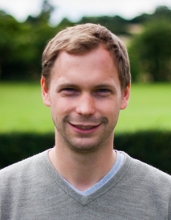Paul Chleboun
Important
My current website can be found here. This site is no longer maintained since Sept. 2011.
I completed my PhD in September 2011, following which I completed a Post-Doc at the Dipartimento di Matematica of the Universita Roma Tre, working on metastability and glassy dynamics in kinetically constrained spin models.
Background
Before joining the Complexity Science Doctoral Training Centre I studied Maths and Physics (MMathPhys) at the University of Warwick. My research interests include,
- Critical phenomena in complex systems
- Interacting particle systems and non-equilibrium statistical mechanics
- Fluid dynamics and turbulence
- Dynamical Systems
- Scientific Computing and Numerical Simulation
For a list of Publications or Talks given please use the navigation panel on the left.
PhD Research
Supervisors: Stefan Großkinsky (Mathematics) and Ellak Somfai (Physics).
The study of interacting particle systems can help to explain and understand the macroscopic behaviour of many physical systems such as granular media or traffic flow on our roads. We aim to develop results in this area with an emphasis on physically relevant issues such as finite size effects and dynamical behaviour. We are currently working on finite size effects in a zero-range process that admits a condensation transition. Finite size effects are of clear importance since physical observations are always made on finite systems. Interestingly this simple model shows behaviour on a finite system that is analogous to phenomena observed in more detailed traffic models and experiments.
Msc Mini Projects
Nonequilibrium phase transitions in perturbed particle systems
In this mini project we investigate the effects of random perturbations in a zero-range process (ZRP). The project is supervised by Stefan Grosskinsky in collaboration with G.M. Schütz. Very brief background and an introduction to the project are available in the form of a poster produced for an advisory board meeting on 21/5/08. More details of the mini project can be found in the final write-up. Some results from the project are included in the following publication,
- S. Grosskinsky, P. Chleboun, G.M. Schütz, Instability of condensation in the zero-range process with random interaction, Phys. Rev. E 78(3), 030101(R) (2008)
Mitigating harbour storms by enhancing nonlinear wave interactions
This mini project was supervised by Petr Denissenko with co-supervision by Sergey Nazarenko and Colm Connaughton, also in collaboration with Sergei Lukaschuk.
Gravity waves of large wave length and amplitude pose risks to docked ships and industry in oceanic harbours. Waves in these harbours are driven at long wave lengths by wind and waves from the ocean and energy dissipation in the system occurs at short wave lengths by wave breaking and white capping. So the main mechanism for the reduction in amplitude of potential hazardous waves is by an energy cascade towards short wavelengths. This energy transfer across scales occurs by means nonlinear wave interactions. In this mini project we investigate the effects of a restriction to a finite free surface (such as in an oceanic harbour) on the energy transfer. We analyse data from the Total Environment Simulator in Hull. A mechanism for choosing other wave modes to excite to potentially enhance the energy cascade away from potentially hazardous modes is proposed. For more details on the project and results see the final write-up. Results were presented at the 2009 British Applied Mathematics Colloquium in Nottingham. The presentation is also here.

CONTACT:
Paul Chleboun
Centre for Complexity Science
Zeeman Building
University of Warwick
Coventry
CV4 7AL
Email:
p dot i dot chleboun at warwick dot ac dot uk
